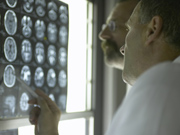Cytokines and the Symptoms of CFS

An important area of research in chronic fatigue syndrome (CFS) is to look at the ways viruses can lead to fatigue and other symptoms that are found in CFS. For many years, scientists have suspected that viruses may be involved in the cause of CFS. In order to understand how viruses may lead to symptoms of CFS, scientists from CDC have been working with researchers from Emory University to study how cytokines, such as interferon-alpha, cause CFS symptoms like fatigue.
Cytokines are chemical messengers produced by white blood cells in our bodies, and they help the body fight infection. One cytokine, interferon (IFN)-alpha, protects the body against viruses, because it "interferes" with the ability of viruses to spread.
Studies by the Emory research group have shown that IFN-alpha gets into the brain and causes the release of other cytokines 1. One of these cytokines, interleukin (IL)-6, was found to be related to decreases in a breakdown product of serotonin. Serotonin is a chemical in the brain that helps regulate whether you feel happy or sad. Decrease in the breakdown product of serotonin suggests that IL-6 may decrease serotonin in the brain leading to depression 1.
IFN-alpha has also been found to cause problems in sleeping. People given IFN-alpha developed insomnia (difficulty falling or staying asleep), which was related to fatigue 2.
IFN-alpha also has been shown to cause changes in the secretion of the hormone, cortisol, that are similar to the changes in cortisol found in people with CFS and in breast cancer survivors with fatigue 3. Cortisol is an important hormone that regulates body metabolism and the immune system.
Using brain scans, including magnetic resonance imaging (MRI) and positron emission tomography (PET), Emory scientists have found that IFN-alpha affects two parts of the brain, the basal ganglia and the dorsal anterior cingulate cortex (dACC) 4,5. The basal ganglia play an important role in the regulation of motor activity and motivation as well as symptoms of fatigue. Indeed, IFN-alpha effects on the basal ganglia were linked with symptoms of fatigue 4. Ongoing studies at CDC are currently evaluating whether similar changes in the basal ganglia occur in patients with CFS.
The dACC is a brain region associated with arousal and alarm, and changes in this brain region have been found in connection to anxiety 5.
Research on the ways by which viruses and the body's response to viruses can lead to the symptoms of CFS will help us understand how CFS symptoms are caused and may lead to new treatments for CFS.
References
- Raison, C.L., Borisov, A.S., Majer, M., Drake, D.F., Pagnoni, G., Woolwine, B.J., Vogt, G., Massung, B., Miller, A.H. Activation of CNS inflammatory pathways by interferon-alpha: relationship to monoamines and depression. Biol Psychiatry, 65(4):296-303, 2009.
- Raison, C.L., Rye, D.B., Woolwine, B.J., Vogt, G.J., Bautista, B.M., Spivey, J.R., Miller, A.H. Chronic interferon-alpha administration disrupts sleep continuity and depth in patients with hepatitis C: association with fatigue, motor slowing and increased evening cortisol. Biol Psychiatry. In Press
- Raison, C.L., Borisov, A.S., Woolwine, B.J., Massung, B., Vogt, G., Miller, A.H. Interferon-alpha effects on diurnal hypothalamic-pituitary-adrenal axis activity: relationship with proinflammatory cytokines and behavior. Molecular Psychiatry, 15, 535–547, 2010.
- Capuron, L., Pagnoni, G., Demetrashvili, M., Lawson, D.H., Fornwalt, F., Woolwine, B.J., Berns, G.S., Nemeroff, C.B., Miller, A.H. Basal ganglia hypermetabolism and symptoms of fatigue during interferon-alpha therapy. Neuropsychopharmacology, 32(11): 2384-92, 2007.
- Capuron, L., Pagnoni, G., Demetrashvili, M., Woolwine, B.J., Nemeroff, C.B., Berns, G.S., Miller, A.H. Anterior cingulate activation and error processing during interferon-alpha treatment. Biological Psychiatry, 58:190-6, 2005.
Contact Us:
- Centers for Disease Control and Prevention
1600 Clifton Rd
Atlanta, GA 30333 - 800-CDC-INFO
(800-232-4636)
TTY: (888) 232-6348 - cdcinfo@cdc.gov



